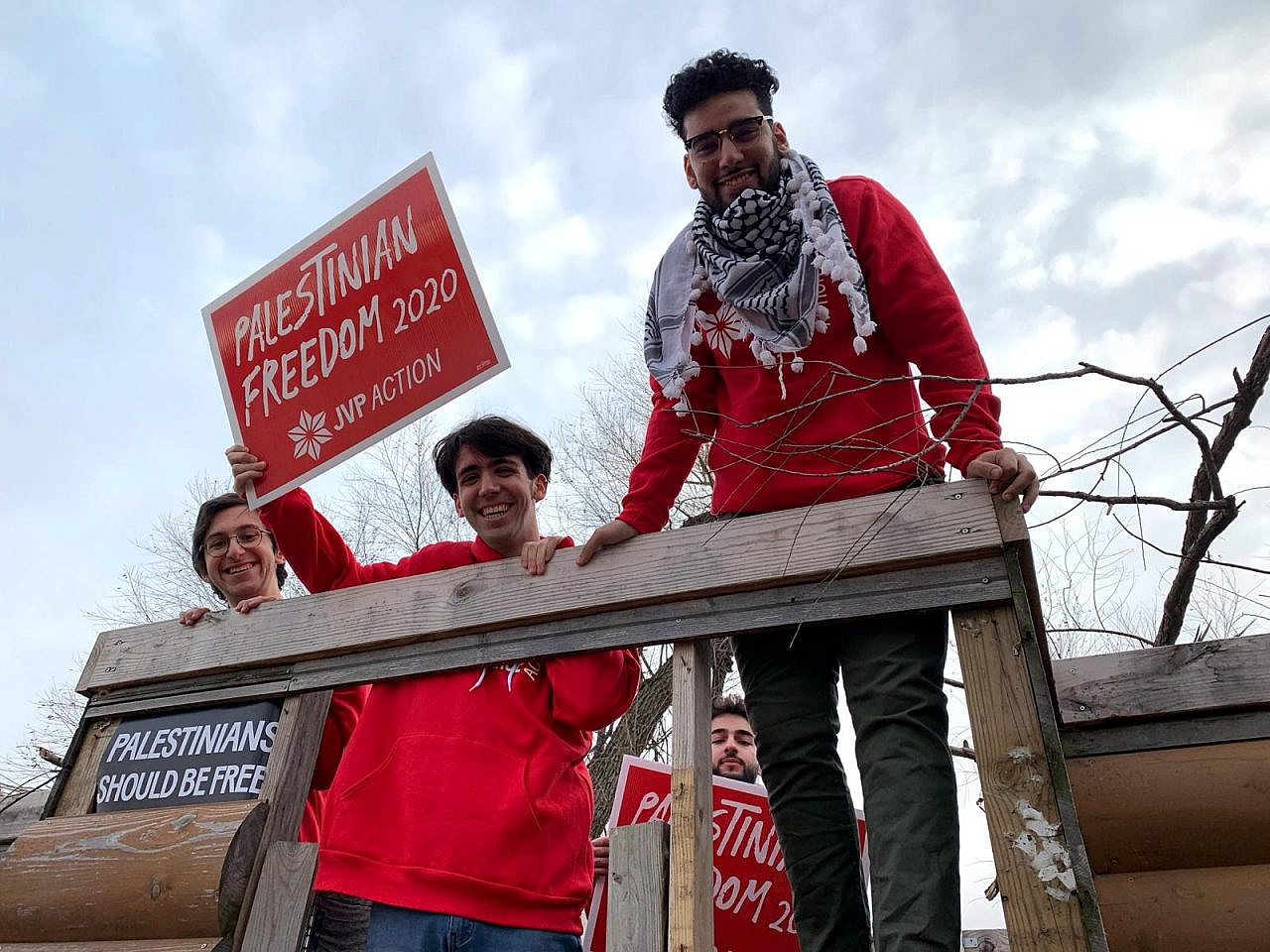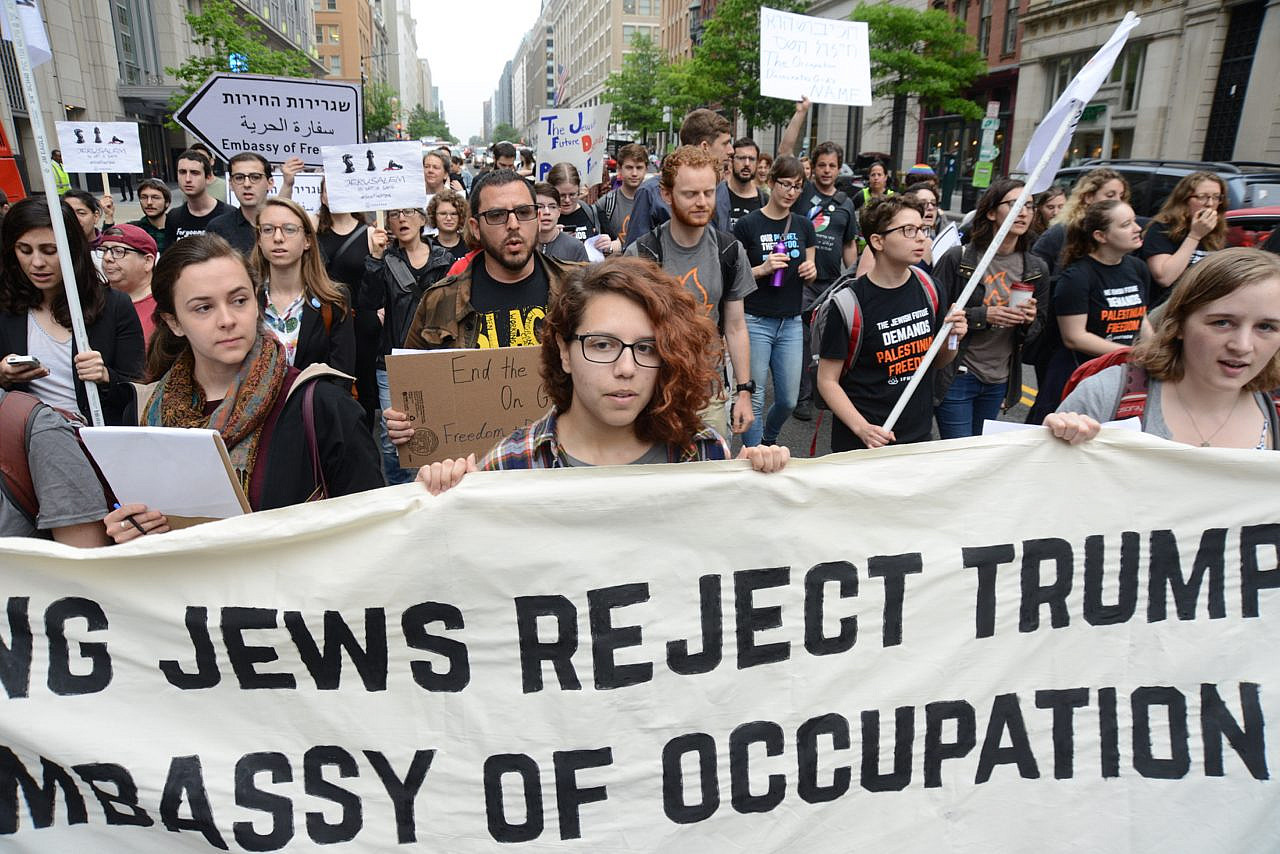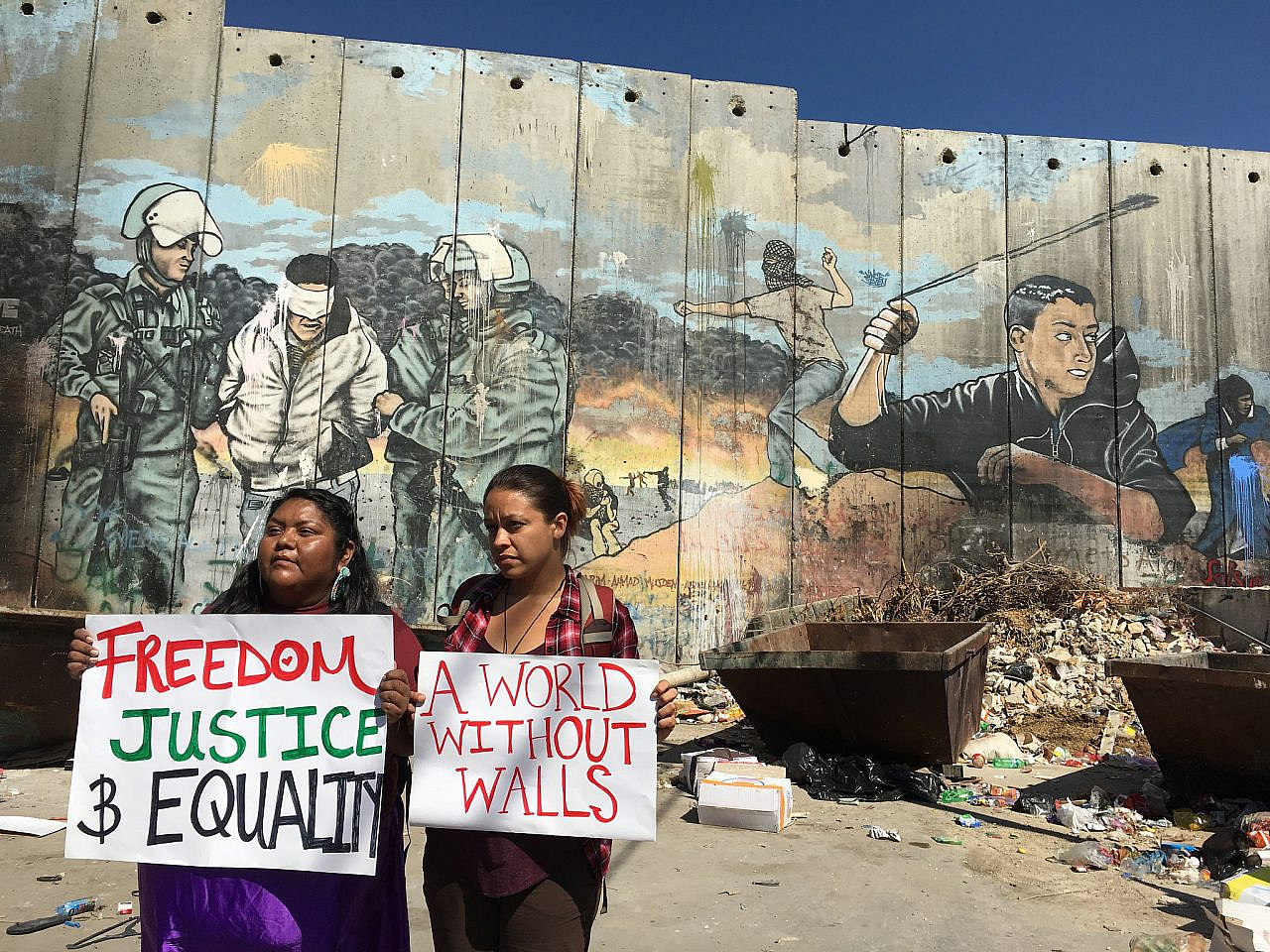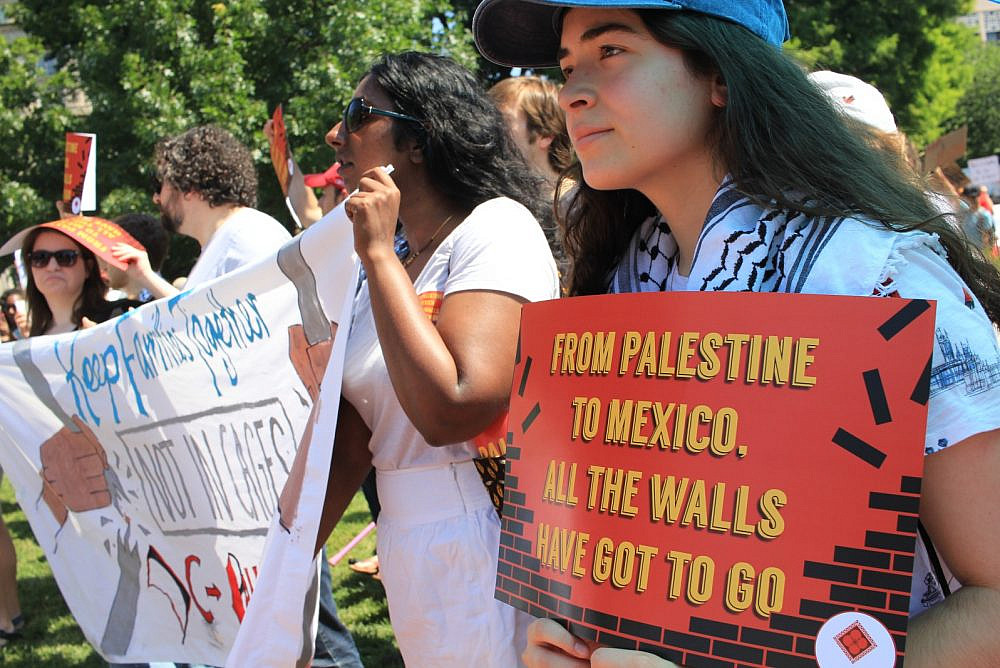During the early days of the COVID-19 lockdowns across the United States, it seemed as if political advocacy unrelated to the pandemic was getting lost in the wall of noise around the state of emergency. The multiple crises of mass unemployment, mass sickness, and looming mass death took over our newsfeeds as individuals, communities, societies, and governments grappled with the ways in which the world had seemingly transformed almost overnight.
Yet despite the pandemic’s opening of uncharted territory, many are finding that it has also exposed, in laser-like fashion, existing structural oppressions on a global scale. This exposure has in turn served to reinforce, rather than crowd out, the messages of progressive movements worldwide — and Palestine advocacy groups are no exception.
In conversations with +972, those active in the U.S. movement for Palestinian rights stressed that even as the outbreak of the virus has posed new practical and strategic challenges, the pandemic’s laying bare of long-running, rampant injustices has actually underscored their fight to unmask and connect various forms of oppression. Precisely because of our state of emergency, advocates say, there is fertile ground for mobilizing people around the Palestine movement’s core demands of freedom, justice, dignity, and equitable distribution of resources.
“The crisis has provided a moment of revelation in some ways,” says Sandra Tamari, executive director of the Adalah Justice Project, a grassroots group that aims to connect the Palestinian struggle to other social justice efforts in the U.S. The fact that the world is facing a threat that cannot be militarily defeated, she adds, is forcing people to reassess the things they have traditionally relied on for a sense of security.
“Our messaging has always been that weapons, borders, walls, militarism have not made us more safe,” Tamari says. With the spread of the coronavirus exposing more than ever the United States’ chronic neglect of healthcare and welfare, she continues, people are likely to be more receptive to ideas such as challenging the extensive military funding provided to Israel.
The idea that “we shouldn’t be sending Israel $3.8 billion a year for weapons, that we should be investing that instead in housing, food security, and other critical needs for our community, here and globally, resonates much more strongly now,” Tamari says.
Stefanie Fox, executive director of Jewish Voice for Peace, also notes the pandemic’s clarifying impact. It “tells very clearly the story of who is vulnerable and who is being killed by this crisis, as well as by the larger structures in place that create the vulnerability.” She adds that with Israel-Palestine in particular, this is a moment in which to emphasize that “the occupation and the siege create conditions that incubate death, even before the pandemic.”

The pandemic’s multifaceted nature has also opened up an expansive front on which to organize. “Public health is politics writ large, so it’s a way for us to elevate our political strategy in a very clear way,” Fox continues. “What are the connections we can make between issues globally? Where can we build leverage on our issues in this moment, toward a more humane U.S. foreign and domestic policy, and ending the siege [on Gaza] and ending military funding for Israeli injustice? How do we keep these issues at the center of our view as we walk through a crisis?”
Ramah Kudaimi, deputy director of the U.S. Campaign for Palestinian Rights (USCPR), a coalition of groups that seeks to advance Palestinian rights through changes in U.S. policy, strikes a similar tone. In her eyes, the uneven impact of COVID-19 along racial and economic lines is opening up broader conversations about prioritizing resources, especially when their misallocation is contributing to oppression. “We need to think through where we are investing our resources and where we need to divest from so we can invest in things like education and healthcare and ventilators and nurses,” Kudaimi says.
In this vein, Palestine rights advocates have been highlighting mass incarceration as a key focus area during the pandemic.
“We’ve been talking about the carceral state as related to Palestine-Israel and the U.S. for some time,” says Fox, adding that the role of prisons in incubating the coronavirus has given the issue a new framing and urgency. JVP recently held an online rally under the heading “Free All Prisoners From Rikers Island to Palestine,” referring to the jail in New York which currently has an infection rate significantly higher than the rest of the city, making it one of the worst-hit places in the world.
The USCPR is similarly emphasizing the role that prisons play in COVID-19’s disproportionate impact on vulnerable groups in both countries. Like JVP, the USCPR is emphasizing its support of H.R. 2407, a bill introduced in 2019 by Rep. Betty McCollum (D-Minn) that seeks to ban the use of U.S. military funds to imprison, interrogate, or abuse Palestinian children in the occupied territories. “Whether you’re organizing on behalf of Palestinian children in Israeli prisons or prisoners here in the U.S., the message should be freedom for all,” Kudaimi says.
The pandemic has also triggered intense focus on the Gaza Strip. In the early days of the virus’ arrival in Israel-Palestine, IfNotNow, which aims to end American-Jewish support for the occupation, began a dedicated campaign to raise the alarm about the potentially devastating consequences should COVID-19 take hold in Gaza.

“We felt there weren’t enough people taking a stand in the face of that possibility,” says Becca Lubow, an INN member. “There’s been a public health crisis in Gaza for decades, and in the same way the coronavirus has revealed existing problems in the U.S. — bringing the healthcare crisis even more into the light — it’s also underscored all the existing problems created in Gaza by the Israeli blockade.”
The group set about fundraising for medical supplies, raising over $15,000 for personal protective equipment to be sent to Gaza. INN then pivoted to political education on Gaza, Lubow says, seeking to challenge American-Jewish establishment “myths” about the blockade. Major communal organizations have “for years assigned total blame for the situation in Gaza on Hamas while expressing care for the people living there,” she says. “And if you really care for them, now is the moment to speak up about what could be a humanitarian catastrophe.”
Part of this effort has involved focusing on the restrictions that the U.S. lockdown has imposed on much of the American population. “I hope that the way in which people are currently confined to their houses helps create empathy for people who are trapped in a much more permanent way by living under a blockade for decades,” Lubow says. “We need to use the experiences we’re having right now to gain a renewed commitment to working for a world where everyone is free.”
At the same time, says AJP’s Tamari, this political moment should also be used to connect Gaza to the wider ecosystem of global oppression. “We need to make sure it’s not exceptionalized in any way,” she says, “and that Israel is not exceptionalized in any way. It’s a settler colonial regime with an active frontier, but it’s not the only one. So we need to make sure people understand that they need to oppose what Palestinians are facing, not only because the Israeli regime is so harmful, but because we oppose these kinds of systems around the world.”
This strategy of connecting Palestine to other liberation movements has been one of the hallmarks of its integration into the wider progressive agenda in the United States. It’s an approach that is challenging under these new circumstances, but more critical than ever, Tamari says.
“With the world distracted and people so concerned with their own health and material wellbeing, how do we connect what Israel is doing with authoritarian regimes around the world?” she asks. “How do we talk about Kashmir, about India, about the Philippines? We want that message to be strong so that when the crisis in the U.S. passes, people will continue thinking about how the world is interconnected, and how we’re only as secure as the least secure person on the globe.”
That focus on interconnectedness has helped activists to revise what cross-communal organizing looks like under quarantine. For example, AJP has been looking at creating conversations between organizers of mutual aid efforts in the Brooklyn neighborhood of Flatbush and in Palestine, and recently hosted a webinar about “the legacy of mutual aid in Indigenous, Black and Palestinian communities.” Like JVP’s prisoner rally, the idea is to ensure that our newly hyper-localized reality does not curtail the scope of grassroots activism.
Nonetheless, there is widespread acknowledgement that raising awareness around foreign policy issues in general, and Palestine in particular, is tougher during a crisis such as this. Fox points out that the impending formalization of Israeli annexation of parts of the West Bank demonstrates how the pandemic can serve as a distraction — and one that Netanyahu is relying on in order to push through his agenda, Lubow adds.

Kudaimi, though, cautions against letting the “false dichotomy” between domestic and international issues slip by unchallenged. “It doesn’t matter whether it’s militarization of local police forces or bombing campaigns abroad — it’s the same forces of racism and imperialism” at work, she says.
To this end, the USCPR has put together a “toolkit” for organizing under COVID-19, which interlinks Palestine with issues in the United States such as migrant justice, anti-Asian racism, and support for caregivers. “We’re bringing it all together to give people ideas on how to continue their activism for Palestinian rights in a moment that is forcing people to rethink how they do activism in general,” explains Kudaimi.
This moment of reckoning has emerged while the pandemic — even as it has driven much of the world physically apart — has made clear the “depth of our interdependence,” as INN’s Lubow puts it. Tamari notes that with more people than ever questioning the role of the government, the emphasis should be on finding ways to mobilize them while creating “a community of people who understand that we are literally connected through the air we breathe.”
Part of that process, Fox says, involves seeing this moment for the global “crossroads” it is: “It’s either right-wing strongmen from the U.S. to Israel to Brazil using this moment to increase control and maximize profits, or it’s using this moment to fight for the systems that prioritize a healthy, viable future for people and the planet.”
And for Tamari, this is precisely the time for the left to press that case. “A moment of crisis is when progressives can take charge of the narrative,” she says. “It requires optimism and hope, and forward thinking. We’ve been offering the vision that a different world is possible. And here we are.”


